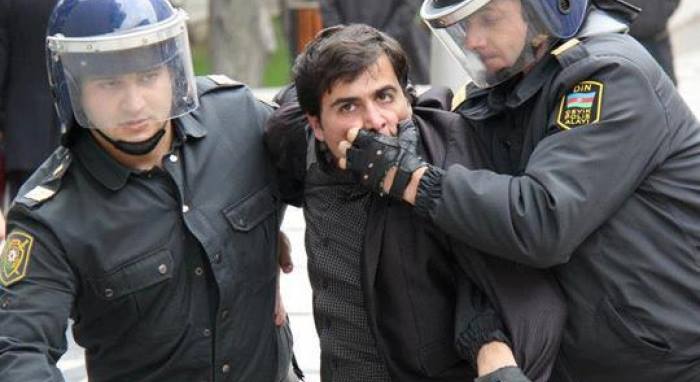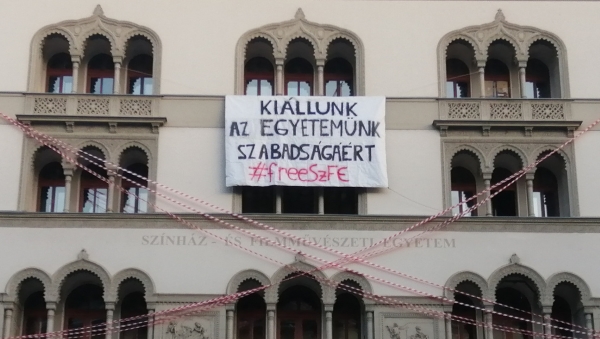The paper is a follow up on the analysis of the destruction of the rule of law in the 2010-14 period that was prepared by Eötvös Károly Public Policy Institute, the Hungarian Helsinki Committee and the Hungarian Civil Liberties Union in spring 2014.
The destructive effects of governmental actions in the 2010-14 period have grown ripe by the 2014-18 cycle. By changing the rules of the electoral system to its own interests the governing party paved the way for the 2014 elections. The changeover to a single-round system, ensuring validity even with a low turnout, the modified electoral districts, and a system operating on the basis of the majority principle all ensured that the governing party could acquire a two-thirds majority with only 44,5% (2,1 million) of the votes. That Fidesz obtained more votes in the 2002 and 2006 elections, which it lost, than in 2014, which it won, shows the absurdity of the situation.
Thereafter the monstrous machinery worked smoothly, leaving no one in doubt for long as to its possible directions. In his speech in July 2014 at Tusvanyos, the Prime Minister made it clear that his administration is transforming the country into a work-based, illiberal state with such examples in mind as Turkey, Russia or China. The countries set as role models are all autocracies or dictatorships that either completely ignore or severely restrict political pluralism, the freedom of the press, individual freedoms, minority rights or private property. The PM’s words and government actions show clearly that the governing majority is committed to pulling down western-style constitutional democracy.
I. The Hungarian Ingsoc
It seemed that by the 2014-18 cycle several social issues reached a nadir: education, health care and corruption all became powder kegs. However, the refugee crisis proved to be useful for the government to divert attention from these critical areas. By focusing on the refugee crisis it managed to boost its popularity and quite cynically, without any firm conviction or ideology, it launched a scapegoat-seeking hate campaign against refugees who came in large numbers into the country in 2015.
Instead of making appropriate preparations to receive the refugees, the government tried to shape public opinion against them. In his statement following the Charlie Hebdo attack in France, in January 2015 Orbán used the terms terrorist and refugee misleadingly and blurred the distinction. Using taxpayers’ money, a nation-wide anti-refugee billboard campaign formed public opinion and soon a national consultation was launched on “immigration and terrorism”. State-owned media confirmed and increased people’s concerns with biased and inflammatory coverage. Meanwhile, the southern border of the country was sealed off with a razor-wire fence and a refugee-related emergency situation was introduced and then prolonged unlawfully for a long period. From this point on asylum seekers practically have not been able to enter the country lawfully. In spring 2016 the government abolished the social allowance of refugees who had earlier been granted refugee status, leaving no chance for their integration. The hysteria reached its peak with the referendum initiated by the government in February 2016 on the quota system of the EU. In spite of the fact that the ballot question did not comply with statutory requirements (it asked a question that does not belong to the competence of the parliament and the question was ambiguous), no authority that would have been entitled to stop the process did so (neither the National Election Committee, nor the Supreme Court).
Though the low turnout made the entire referendum invalid, seizing upon the fact that the majority of voters rejected the EU quotas, the Prime Minister chose to interpret the referendum result as political authorisation from the people and initiated the seventh amendment to the Fundamental Law. According to the proposed amendment the state is obliged to protect the constitutional identity of Hungary and it also stipulates that the EU’s exercise of power cannot violate fundamental rights and it cannot limit Hungary’s “inalienable sovereignty over its territorial integrity, population, form of government and state structure.” While the amendment seems to send a message to Brussels, it cannot interfere with the primacy of EU law, namely, in areas belonging to the scope of the EU national provisions that are contrary to EU law cannot be applied. Nevertheless, it can’t be said that the seemingly void text carries no risks: the Constitutional Court, filled with judges loyal to the government, can interpret the sentences of the Fundamental Law in a way advantageous for the given political interests of the government. As for the prohibition of the settlement of foreign populations and the requirement of individual asylum requests: these stipulations might seem to be contrary to the EU quota system, but in reality they can be brought into line. All in all: the proposal does not introduce novelty in public law – it rather serves government propaganda.
Enacting the state of terror threat has been another measure to increase popularity and power. The idea of passing a provision on special legal order into the Fundamental Law first came to light at the beginning of 2016 but the government couldn’t push it through parliament (the governing parties lost their two thirds majority in an interim election in February 2015 and the opposition opposed the law). At the initial stage the proposal was hidden from publicity and then it was adopted in the framework of the sixth amendment without any discussion on the merits. According to the amendment, the emergency state of terror threat can be introduced by the parliament upon the motion of the government in case of a terror attack or if there is a significant and direct risk of such an attack. In such a state of emergency the government might pass decrees which suspend certain laws or divert from certain laws and might take other extraordinary measures, all paving the way to the arbitrary exercise of power.
II. Economic occupation and the enrichment of the privileged
While in the 2010-14 period the reshuffling of public law enjoyed priority on the agenda, in the second phase the emphasis falls on the reshuffling of key economic interest groups. The government introduces new regulations for entire sectors in order to confer an advantage on those whom it favours. The declared aim of the PM is to raise the Hungarian – in practice, buddies’ – share above 50% in the financial, media and energy sector. This objective has partly been reached. Simultaneously, state transparency is getting weaker and weaker and those exercising public power are less and less controllable.
The re-allocation of arable land is an apt example for the redistribution of resources. After the termination of leases, the redistribution of land takes place in the agrarian sector through corrupt tendering and legislation, which is assisted by the Constitutional Court. In October 2016 the Budapest-Capital Regional Court turned to the Constitutional Court in the case of Kishantos Rural Development Centre against the National Land Fund Managing Organisation. According to the Budapest-Capital Regional Court the evaluation of proposals is non-transparent as there are no objective requirements and legal remedy is not available if the contract made as a result of the tender complies with rules but the tender itself, the call and the evaluation broke the rules. Now it is up to the Constitutional Court to annul at least a part of the unconstitutional provisions.
An especially sad example of gaining economic influence with a political purpose is the ruthless termination of the daily broadsheet Népszabadság. The employees of the daily were notified of being exempted from work from one day to the other and they were denied access to their computers, e-mails and documents. The case raised a range of fundamental rights violations: the employees’ right to privacy, as well as the protection of information and informant were all presumably breached.
Intent on reducing the transparency of the state, the government is restricting access to data of public interest. In issues that throw an unfavourable light on the government it initiates the amendment of laws in order to de-classify inconvenient data. In spring 2016 parliament passed legislation on classifying public interest data related to the contracts of the Hungarian Post, the economic corporations owned by the Hungarian National Bank as well as the foundations established by the Hungarian National Bank as confidential. The President of the Republic did not sign these laws but asked the Constitutional Court to review them. The Constitutional Court approved the confidentiality of the contracts of the Hungarian Post, while held that by establishing foundations the money of the Hungarian National Bank does not lose its public character and the bank has to be accountable for it.
Besides adopting legal rules tailored for certain cases, in the shadow of the quota referendum in October 2016 the government further restricted access to data of public interest: citizens have to pay if they want to know data of public interest. The tariff (e.g. for copying or for human resources if the work needed to gather the data exceeds four hours) is defined in the relevant government decree.
III. Unwillingness to conform will not be tolerated
The institutional system that was re-shaped in the 2010-14 period after the adoption of the Fundamental Law and that became increasingly obedient to the power-hungry government performed according to expectations. Today state institutions exercise their power not only with an eye on the interests of the government but there have been cases where the government used the domesticated institutions unlawfully for its own purposes. What is more, it has also occurred that problems were “solved” by suspicious security companies, laying the ground for intimidation.
At the middle of the 2014-18 period the Constitutional Court consists exclusively of judges who were nominated and elected unilaterally by the governing coalition, disregarding the opinion of the opposition. The Court has not let the government down: in most cases, particularly in symbolic cases it favours the government in its decisions, not providing any check at all against the legislature and the executive. For example, according to the Constitutional Court, neither the municipal electoral system that rewards the winners in the capital, nor the nationalisation of the tobacco retail trade and then the re-granting of concessions are unconstitutional. Similarly, that the police unlawfully prohibited the protest in front of the PM’s house with judicial consent was not deemed unconstitutional either.
Like the Constitutional Court, the Commissioner for Fundamental Rights performed poorly. Though the Commissioner is entrusted with the protection of fundamental rights and according to the relevant law he should pay special attention to the most endangered groups, for a long time he was utterly silent about the refugees and did not examine their situation. Hungary has not faced a human rights crisis of such degree since the political transition from socialism, yet the refugees did not get any protection from the ombudsman, the only state institution for the protection of rights.
Though the prosecution is defined in the Fundamental Law as an independent organisation, currently it serves the government. It does not investigate issues that are inconvenient for the government, like the US travel ban list of top Hungarian officials, the Quaestor scandal, real estate cases in the city centre or the expenditure of the Hungarian National Bank.
The harassment of civil organisations supported by the EEA/Norway Fund, which started in spring 2014, is an example of how the government uses the institutional system for its own needs and interests. Besides János Lázár és Nándor Csepreghy, the PM himself also described NGOs as paid political activists. The government, or as it later turned out the PM himself, asked the Government Control Office to carry out an audit against NGOs receiving support from the EEA/Norway Fund and against the consortium distributing the grants. The NGOs as well as the secretariat of the EEA/Norway donor states contested the GCO’s legal authority to carry out the audit, arguing that according to the relevant rules the GCO is a state agency vested with the task to audit state money and any potential audit of the Norway grants lies with the donor states. Nonetheless, the GCO carried out on-site audits and requested documents from NGOs with tight deadlines, and threatened the NGOs with imposing fines and suspending their tax number in the event of non-compliance. At one point even police raids took place on the premises of two of the consortium members, blatantly excessive and unnecessary measures. The court finally found that the NGOs’ activities were lawful and they could keep their tax number that had been suspended by the government earlier.
In February 2016, when István Nyakó socialist MP wanted to submit his initiation for a national referendum on Sunday shop closure in the building of the National Election Office, he was held up physically by members of a group of unknown background who acted in the interests of the government. The issue went without any consequences as neither the prosecution, nor the police investigated the case. The bald-headed men who acted unlawfully were identified with the help of social media: several of them had ties to Fradi (a Hungarian football club) Security.
In summer 2016 the same security guards acted against people who protested peacefully against the reconstruction of Városliget, one of the biggest parks of Budapest. This time the guards went further than intimidation: they acted violently. They hit and sprayed protesters while the police stood by idly. Quite absurdly, the police did not act even against guards who used the gas spray against policemen.
***
In the past one and a half years there have been significant changes in the way the National Cooperation System operates. Earlier the system justified its decisions by referring to values and ideologies, sometimes even morals. This has come to an end: the government often acts aggressively, intimidates and discredits its opponents, ignores strong or resolute opponents and in some cases it retreats. These methods of conflict resolution might indicate that the National Cooperation System is losing momentum but they might also project a system even more restrictive and unpredictable, where the very fundamentals of legal certainty are challenged.
The analysis can be downloaded here:






